人教版新目标初中九年级英语全册教案
- 格式:doc
- 大小:1.19 MB
- 文档页数:177
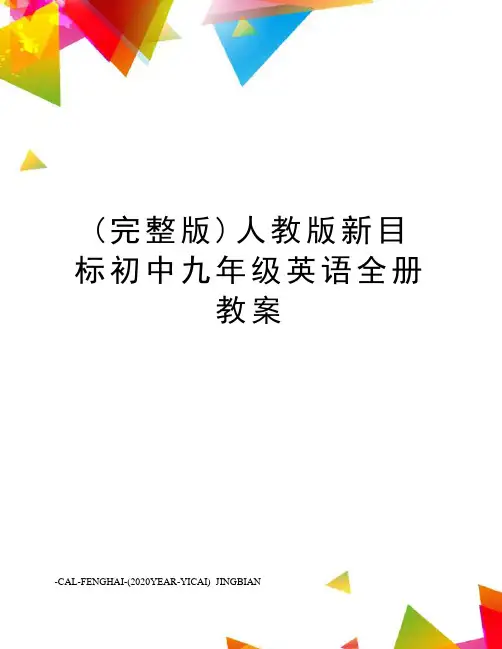
(完整版)人教版新目标初中九年级英语全册教案-CAL-FENGHAI-(2020YEAR-YICAI)_JINGBIANUnit 3 Teenagers should be allowed to choose their own clothes.Section AThe Third PeriodTarget language:A: What rules do you have at home?B: Well, I'm not allowed to go out on school nights. How about you?A: I'm not allowed to go out on school nights either. But I can study at a friend's house.教学难点Talk about agreement and disagreement.教学内容及教师活动学生活动设计意图Step 1 RevisionCompetition: Write “are allowed to” and “aren't allowed to” on the blackboard. Divide the class into groups.Each group is asked to write down as many things as they can think of about what teenagers are or aren't allowed to do. See which group can think of the most items for each category.Step 2 PresentationI.1aThis activity reviews the use of always, sometimes, usually and never.Point to the picture. Ask students to describe what is happening in the picture.Help students to say, The boy is late for class. Invite a student to read the four questions in the box to the class.Read the instructions and remind students of the exact meanings of the adverbs of frequency. Work as theteacher says.Look at thepictures and saywhat is happeningin each picture.Students finishthe task on their激发学生兴趣,对所学知识进行复习,使记忆更加深刻。
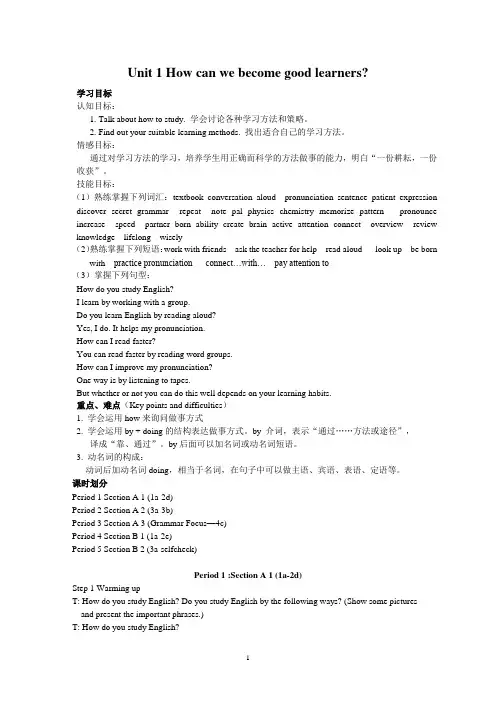
Unit 1 How can we become good learners?学习目标认知目标:1. Talk about how to study. 学会讨论各种学习方法和策略。
2. Find out your suitable learning methods. 找出适合自己的学习方法。
情感目标:通过对学习方法的学习,培养学生用正确而科学的方法做事的能力,明白“一份耕耘,一份收获”。
技能目标:(1)熟练掌握下列词汇:textbook conversation aloud pronunciation sentence patient expression discover secret grammar repeat note pal physics chemistry memorize pattern pronounce increase speed partner born ability create brain active attention connect overview review knowledge lifelong wisely(2)熟练掌握下列短语:work with friends ask the teacher for help read aloud look up be born with practice pronunciation connect…with… pay attention to(3)掌握下列句型:How do you study English?I learn by working with a group.Do you learn English by reading aloud?Yes, I do. It helps my pronunciation.How can I read faster?You can read faster by reading word groups.How can I improve my pronunciation?One way is by listening to tapes.But whether or not you can do this well depends on your learning habits.重点、难点(Key points and difficulties)1. 学会运用how来询问做事方式2. 学会运用by + doing的结构表达做事方式。
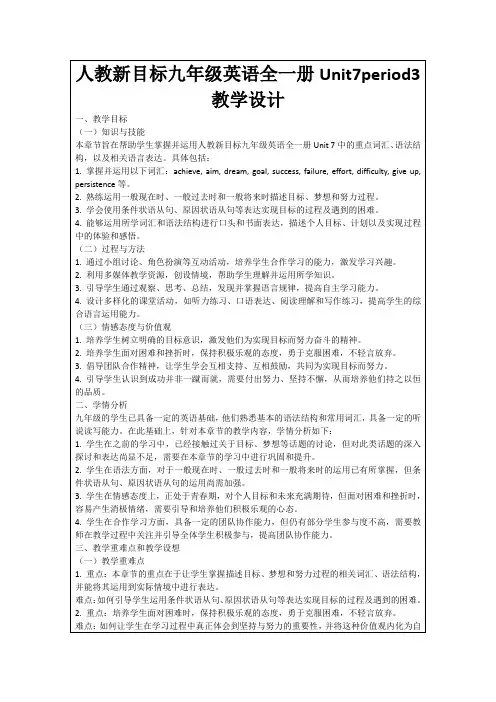
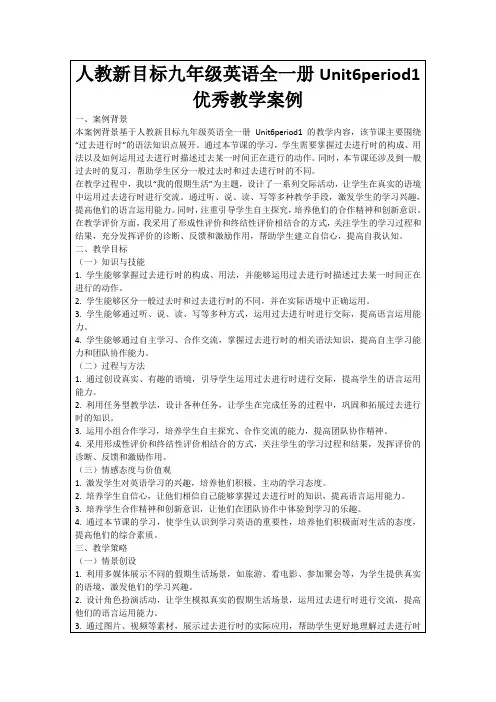
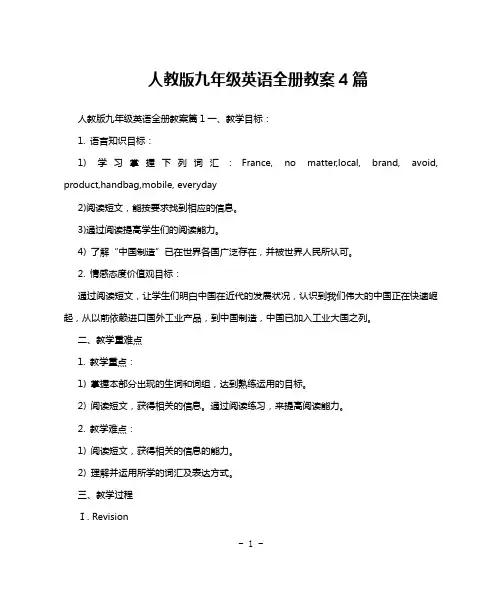
人教版九年级英语全册教案4篇人教版九年级英语全册教案篇1一、教学目标:1. 语言知识目标:1) 学习掌握下列词汇:France, no matter,local, brand, avoid, product,handbag,mobile, everyday2)阅读短文,能按要求找到相应的信息。
3)通过阅读提高学生们的阅读能力。
4) 了解“中国制造”已在世界各国广泛存在,并被世界人民所认可。
2. 情感态度价值观目标:通过阅读短文,让学生们明白中国在近代的发展状况,认识到我们伟大的中国正在快速崛起,从以前依赖进口国外工业产品,到中国制造,中国已加入工业大国之列。
二、教学重难点1. 教学重点:1) 掌握本部分出现的生词和词组,达到熟练运用的目标。
2) 阅读短文,获得相关的信息。
通过阅读练习,来提高阅读能力。
2. 教学难点:1) 阅读短文,获得相关的信息的能力。
2) 理解并运用所学的词汇及表达方式。
三、教学过程Ⅰ. Revision1. Ask Sstorole-play the conversation in 2d.2. Checkthehomework. Let some Ss tell read their sentences.(1). This ringismade of silver.(2). This kindofpaper is made from wood.(3). What ispaintmade from?(4). Hang Zhouisfamous for tea.(5). As far asIknow, tea plants are grown on the sides of the mountains.Ⅱ. Lead in1. 展示一段伦敦奥运会礼品的视频,让学生了解中国制造已被世界人民所接受。
Then ask Sssomequestions:T: As we know,thereare so many things made in China in England. What about in America andothercountries in the world? Now let’s read the passage of 3a.First, readquickly and find the answer to this question:1) Where did KangJianvisit last year?2) Were theremanythings made in China in the US?3) What twothingsdid Kang Jian want to buy in the US?4) Where weretheymade?Ss read thearticlequickly and try to answer the questions:2. 方法指导:带着问题,然后快速阅读短文,争取在较短的时间内,找到答案。
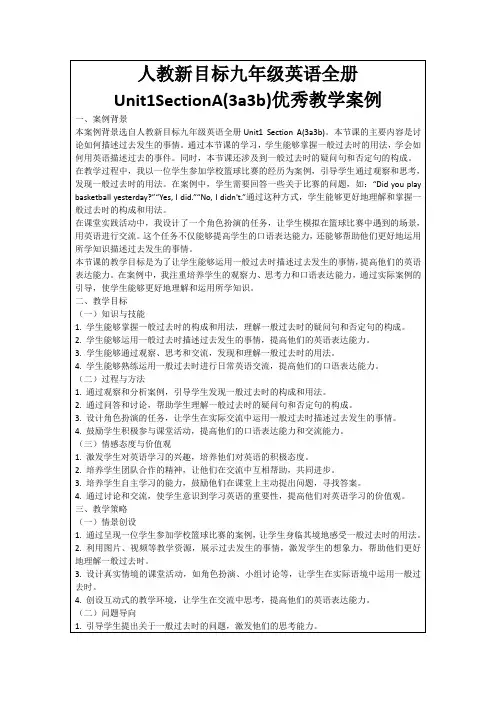

Unit 1 How can we become good learners?Language GoalTalk about how to study【语言目标】Knowledge Goals【知识目标】textbook , conversation ,aloud , pronunciation ,sentence ,patient ,expression ,discover ,secret ,grammar, repeat , note , physics , chemistry ,Key Words,speed,partner ,born ,ability ,pronounce ,increasecreate ,brain ,active ,attention ,connect ,review ,knowledge , wiselylook up,help ,fall in love with ,be born Key Phrases,connect withwith , pay attention to— How do you learn English?—I learn by studying with a group.2.— Do you learn English by reading aloud?— Yes, I do.It helps my pronunciation.Key Sentences3.— How can I read faster?— You can read faster by reading word groups.4.— How can I improve my pronunciation?—One way is by listening to tapes.Learn to use “verb +by doing(gerund) ”to express Key Grammarways of doing things.listening ,speaking ,reading and writingskills by using the target languages.Ability Goals 2 . Learn to talk about ways of studying , give suggestions to help others overcome their【能力目标】obstacles in study and discuss how to learn betterusing “by doing sth. ”.the help of this unit's study ,students canthink and learn how to study English and they will Moral Goals be encouraged to be active and hard - working 【感情目标】learners.2.Learn to communicate and cooperate with othersin study.Teaching Time【课时】Five periodsPeriod 1 Section A(1a - 2d)Period 2 Section A(3a - 4c)Period 3 Section B(1a - 1e)Period 4 Section B(2a - 2e)Period 5 Section B(3a - 3b) & Self Check本单元环绕学习的话题,叙述了学习的阻碍及对应的解决方法,对学生的学习有重要意义。
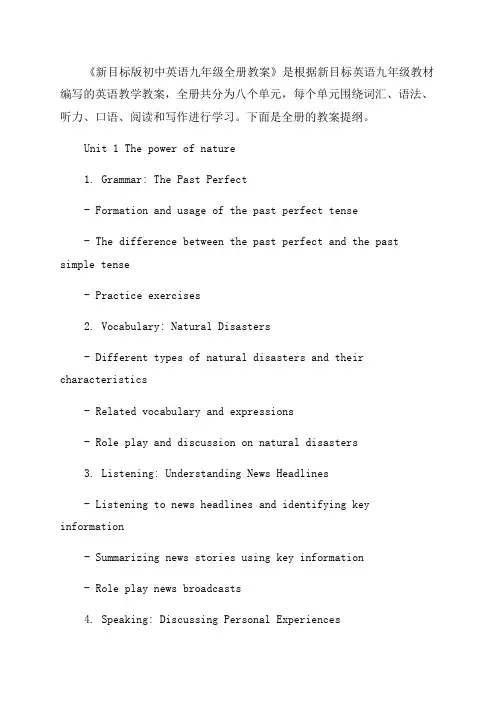
《新目标版初中英语九年级全册教案》是根据新目标英语九年级教材编写的英语教学教案,全册共分为八个单元,每个单元围绕词汇、语法、听力、口语、阅读和写作进行学习。
下面是全册的教案提纲。
Unit 1 The power of nature1. Grammar: The Past Perfect- Formation and usage of the past perfect tense- The difference between the past perfect and the past simple tense- Practice exercises2. Vocabulary: Natural Disasters- Different types of natural disasters and their characteristics- Related vocabulary and expressions- Role play and discussion on natural disasters3. Listening: Understanding News Headlines- Listening to news headlines and identifying key information- Summarizing news stories using key information- Role play news broadcasts4. Speaking: Discussing Personal Experiences- Talking about personal experiences with natural disasters - Giving advice and sharing ideas on disaster preparedness - Group discussion and presentation5. Reading: Survivors’ Stories- Reading and understanding survivors’ stories- Writing a letter to a survivor6. Writing: Descriptive Writing- Writing a descriptive essay about a natural disaster- Focus on sensory details and emotions- Peer review and revisionUnit 2 Life online1. Grammar: The Passive Voice- Formation and usage of the passive voice- Active and passive voice sentence transformations- Practice exercises2. Vocabulary: Internet Terms- Understanding internet slang and abbreviations- Role play and discussion on internet usage3. Listening: Online Safety- Listening to a dialogue about online safety- Understanding key safety tips and precautions- Role play and discussion on online safety4. Speaking: Debating Social Media- Discussing the pros and cons of social media- Presenting arguments for and against using social media- Group debate and discussion5. Reading: Cyberbullying- Reading and understanding an article about cyberbullying - Writing a letter to a cyberbullying victim6. Writing: Persuasive Writing- Writing a persuasive essay on online privacy- Focus on providing strong arguments and evidence- Peer review and revision以上只是教案的大致提纲,详细的教案内容还需要根据具体的教学计划和教材内容进行更细致的编写和调整。
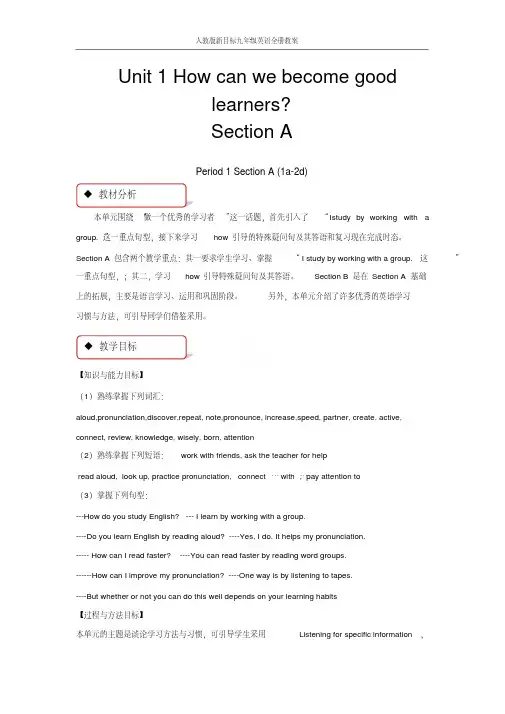
Unit 1 How can we become goodlearners?Section APeriod 1 Section A (1a-2d)本单元围绕“做一个优秀的学习者”这一话题,首先引入了“I s tudy by working with a group.”这一重点句型,接下来学习how 引导的特殊疑问句及其答语和复习现在完成时态。
Section A 包含两个教学重点:其一要求学生学习、掌握“I study by working with a group.”这一重点句型,;其二,学习how 引导特殊疑问句及其答语。
Section B 是在Section A 基础上的拓展,主要是语言学习、运用和巩固阶段。
另外,本单元介绍了许多优秀的英语学习习惯与方法,可引导同学们借鉴采用。
【知识与能力目标】(1)熟练掌握下列词汇:aloud,pronunciation,discover,repeat, note,pronounce, increase,speed, partner, create, active, connect, review, knowledge, wisely, born, attention(2)熟练掌握下列短语: work with friends, ask the teacher for helpread aloud, look up, practice pronunciation, connect …with …, pay attention to(3)掌握下列句型:---How do you study English? --- I learn by working with a group.----Do you learn English by reading aloud? ----Yes, I do. It helps my pronunciation.----- How can I read faster? ----You can read faster by reading word groups.------How can I improve my pronunciation? ----One way is by listening to tapes.----But whether or not you can do this well depends on your learning habits【过程与方法目标】本单元的主题是谈论学习方法与习惯,可引导学生采用Listening for specific information ,◆教材分析◆教学目标Practicing, Role playing ,Reading 和Writing 等学习策略,学习一些新词汇,掌握一些重点句型,在小组合作学习的过程中,进一步促进学生对现在完成时态的理解和运用。
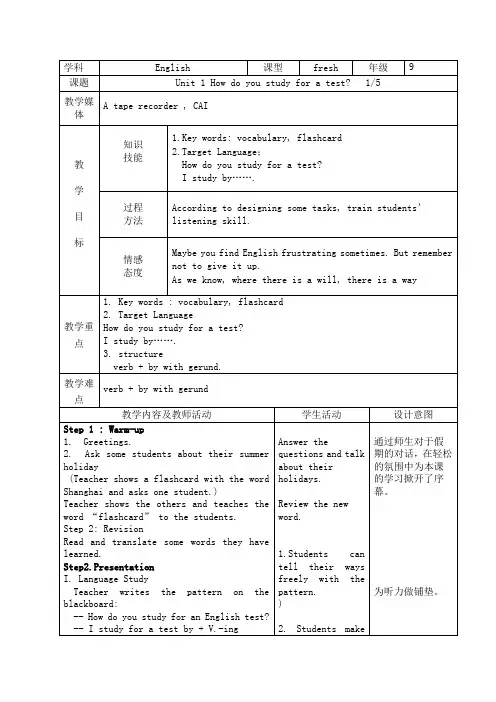
Unit 3 Teenagers should be allowed to choose their own clothes.Section AThe Third PeriodTarget language:A: What rules do you have at home?B: Well, I'm not allowed to go out on school nights. How about you?A: I'm not allowed to go out on school nights either. But I can study at a friend's house.This activity reviews the use of always,sometimes, usually and never.Point to the picture. Ask students to describe what is happening in the picture.Help students to say, The boy is late for class. Invite a student to read the four questions in the box to the class.Read the instructions and remind students of the exact meanings of the adverbs of frequency.Ask students to write A after things they always do, U after things they usually do, S after things they sometimes do and N for things they never do.II. 1bThis activity provides oral practice using the target language.Point out the sample conversation. Ask a pair of students to say it to the class.As the pairs work together, walk around the room offering help if necessary.Ask several pairs to share their conversations with the class. Look at thepictures and saywhat is happeningin each picture.Students finishthe task on theirown in1aPair work.Talk with his/herpartner abouthis/her answers inActivity 1a.对看图作文能力进行培养。
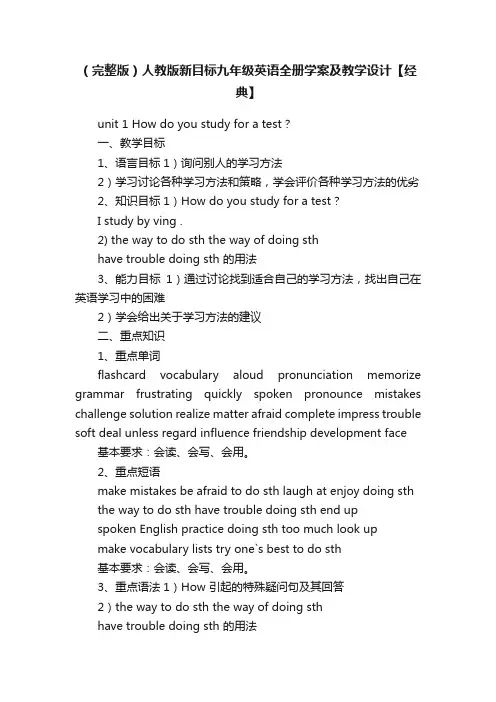
(完整版)人教版新目标九年级英语全册学案及教学设计【经典】unit 1 How do you study for a test?一、教学目标1、语言目标1)询问别人的学习方法2)学习讨论各种学习方法和策略,学会评价各种学习方法的优劣2、知识目标1)How do you study for a test?I study by ving .2) the way to do sth the way of doing sthhave trouble doing sth 的用法3、能力目标1)通过讨论找到适合自己的学习方法,找出自己在英语学习中的困难2)学会给出关于学习方法的建议二、重点知识1、重点单词flashcard vocabulary aloud pronunciation memorize grammar frustrating quickly spoken pronounce mistakes challenge solution realize matter afraid complete impress trouble soft deal unless regard influence friendship development face 基本要求:会读、会写、会用。
2、重点短语make mistakes be afraid to do sth laugh at enjoy doing sth the way to do sth have trouble doing sth end upspoken English practice doing sth too much look upmake vocabulary lists try one`s best to do sth基本要求:会读、会写、会用。
3、重点语法1)How 引起的特殊疑问句及其回答2)the way to do sth the way of doing sthhave trouble doing sth 的用法基本要求:理解其含义,学以致用。
人教版新目标九年级上册英语全册教案集Unit 1 How do you study for a testPart 1: Teaching design (第—局部:教学设计)Structures: verb+by with gerundTarget language:How do you study for testWell, I study by working with my classmates.Have you ever studied with a groupYes, I have. I’ve learned a lot that way.I don’t have a partner to practice English with.Maybe you should join an English club.Vocabulary: flashcard, take notes, frustrating, memorize, aloud, comma, make mistakes, pronunciation, be afraid to, What about…Why don’t you…Learning strategies: Personalizing, Role playingSection AGoals●To talk about how to study●To read about how to studyProceduresWarming up by greetingHello, everyone!From now on you are a ninth grader. Congratulations to you and I wish you a great success in your studies!Today we shall take up the first unit in this new term, Unit 1 How do you study for a testLook at the blackboard and read after me the target language for this unit. When you read pay attention to the structure of the sentence.▲How do you study for test▲Well, I study by working with my classmates.▲Have you ever studied with a group▲Yes, I have. I’ve learned a lot that way.▲I don’t have a partner to practice English with.▲Maybe you should join an English club.Learning to Learn is very important. And learning to pass a test is also very important to you.Learning couldn’t be easier!If you have not developed good ways or methods to study for a test, talk to your classmates about it, your parents, or the teacher like me if you are brave enough. You should be brave enough to talk to others about your problems with your studies.Next I’d like to give you some useful practical advice about studying for a test and also ask you questions to make you think about things such as:▲using your time effectively▲motivation▲how to learn your lessons in the ninth grade year▲different modes of teaching you may meet▲how to develop particular skills, such as note-taking in class 1A: Checking the ways you studyNext turn to page 2 and check √ the ways you study for an English test. Then add other ways you use sometimes.▲How do you study for a testI study for a test___By reading to the tape; By underlining the expressions; By reading beyond the text; By doing used exam papers; By going over exercises books; By copying down the text; By learning the text by heart; By speakingwith classmatesNow raise your hand and report your added ways to the class. I will make a list of all the added ways on the blackboard.1b Listening and writingListen to understand how these people in the picture on page 2 study for a test. Write letters from the pictures. While listening, pay attention to the structures of the sentences.Section A 1b TapescriptBoy1: Hey, gang. There’s a big test on Tuesday. I really need some help. Can you tell me how you study for a big testVoices: Sure! Yes. Sure we will.Boy1: You did really well on the last English test, didn’t you, Mei Girl1: Yeah, I did OK.Boy1: Well, how did you study?Girl1: By making flashcards.Boy1: Maybe I’ll try that. How did you study, PierreBoy2: By asking the teacher for help. She was really happy I asked.Boy1: That’s interesting. How do you study, AntonioBoy3: I like to study by listening to cassettes. But sometimes mymother thinks I’m listening to music. And then she gets mad.Boy1:Oh, well…1c Doing a pairworkNow in pairs ask your partner how he or she studies for a test.A: How do you study for a testB: I study by working with a group.C: I study by listening to English.D. I study by playing games with my classmates.E. I study by doing actions such as coloring, matching.F. I study by singing English songs.G. I study by writingletters and emails.H. I study by acting out simple dialogues.I. I study by listening to and understanding stories.J. I study by writing simple sentences.K. I study by imitating from the recording.L. I study by speaking out words or phrases.M. I study by doing simple role plays.N. I study by reading and understanding simple stories.O. I study by using daily expressions.P. I study by performing short plays.Q. I study by performing simple rhymes.R. I study by writing sentences for pictures.S. I study by writing out simple poems.T. I study by reading aloud correctly.U. I study by playing text plays.V. I study by working with classmates.W. I study by going over the text before class.X. I study by copying words and expressions.Y. I study by looking and saying.Z. I study by asking others questions.2a Listening and checkingNow let’s go to page 3. Listen to the tape and check the questions you ask.While listening, pay attention to the structures of the sentences.Section A 2a, 2b TapescriptGirl1: Welcome to the English club. Today we’re going to talk about the best ways to learn English. Who has an ideaBoy1: Do you learn English by watching English-language videos Girl2: No. It’s too hard to understand the voices.Boy1: What about keeping a diary in English Do you learn English that wayGirl2: I think so. It helps to write English every day.Girl3: Have you ever studied with a groupGirl2: Yes, I have! I’ve learned a lot that way.Girl1: Do you ever practice conversations with a friendGirl2: Oh, yes. It improves my speaking skills.Boy1: What about reading aloud to practice pronunciationGirl3: I do that sometimes. I think it helps.Boy2: I do too. And I always look up new words in a dictionary.Girl3: That’s a great idea!2b Listening and matchingListen again and match each question from 2a with an answer in the box on page 3.2c Doing a pairworkNext we are going to make a conversation in pairs using the information from activities 2a and 2b.A: Have you ever studied with a groupB: Yes, I have. I’ve learned a lot that way.A: Have you ever learned English by watching videosB: Yes, I have. I’ve learned a lot that way.A: Have you ever practiced conversations with friendsB: Yes, I have. I’ve learned a lot that way.A: Have you ever listened to tapesB: Yes, I have. I’ve learned a lot that way.A: Have you ever read aloud to practice pronunciationB: Yes, I have. I’ve learned a lot that way.3a Reading the article and completing the chart1.Reading to the tapeWe are going to read the article on page 4. First we shall read to the tape together. That is, we start reading aloud as the recorder goes, and we stop reading aloud as the recorder stops. While reading, let’s pay enough attention to the pauses, the pronunciation and the intonation of the native reader. Make our reading aloud as the same as the reader’s.2.Reading and dividing the article into partsNext we are going to read aloud the article slowly and clearly. We will try to divide it into thought groups.3.Reading and underliningWe shall read the article once again, this time, to underline all the useful expressions in it. After school, you are going to write them down in your notebook.This week/ we asked students/ at New Star High School/ about the best ways/ to learn more English. Many said/ they learnt/ by using English. Some students had more specific suggestions. Lillian Li, for example, said/ the best way/ to learn new words/ was by reading English magazines. She said that/ memorizing the words of pop songs/ also helped/ a little. When we asked about studying grammar/ she said, “I never study grammar. It's too boring.〞Wei Ming feels differently. He's been learning English/ for six years/ and really loves it. He thinks/ studying grammar /is a great way/ to learn a language. He also thinks that/ watching English movies/ isn't a bad way/ because he can watch the actors/ say the words. Sometimes, however, he finds watching movies/ frustrating/ because the people speak too quickly.Lin Chang said that/ joiningthe English club/ at school/ was the best way/ to improve her English.Students get lots of practice/ and they also have fun. She added that/ having conversations/ with friends/ was not helpful/ at all. ;We get excited/ about something/ and then/ end up speaking/ in Chinese,〞 she said.4.Translating and completing the chartBecause you have read this article many times you are going to translate it into Chinese first and then complete the chart on page 4.Who will be the first to have a tryWays of learning EnglishNot successfulOKSuccessfulLillian LiStudying grammarmemorizing the words of pop songsreading English magazinesWei Mingwatching movieswatching English moviesstudying grammar Liu Changhaving conversations/ with friendsjoining the English club3b Doing a pairworkSilence, please! We are going to have a role play in pairs. One of the pair is to be one of the people in 3a. The other is to interview him or her about learning English.Zhao: Excuse me, Li Hong. Could you help me with my EnglishLi: Yes, please. What’s the matterZhao: I have difficulty studying grammar.Li: Grammar I never studying grammar. I study English mostly by memorizing the words of pop songs.Zhao: No grammar at allLi: Yes, I did study grammar. But I study it by reading English magazines. I put grammar learning into reading articles. That is the best way to understand English grammar.4 Doing a pairworkTurn to page 4 to check √what you do to learn English in the box.Closing down by asking and answering—How did you learn English *I listened to English them every day.*I read English books many times a day.*I learned many English songs by heart.*I sang the English songs to myself.*I learned every new English word in the text.*I learn English by going to English classes.*I do English homework at school.*I read English textbooks in the evening.*I speak English very slowly.*I play computer games in English.*I read a lot of English sentences in the morning.*I do well in class English tests.*I get a lot of good advice on learning English from my teacher. *I discuss English problems with my classmates.*I follow the advice from my father.*I learn English sounds from the tape.*I use English-English dictionaries.*I listen to recordings and English-language TV.*I talk to native speakers every chance I got.*I read books in English, mostly novels.*I learn a lot of new words from English books.*I write more and more e-mail in English.*I use English more than my first language.*Most of my reading (websites and books) is in English. Section BGoals●To listen about learning English●To talk about learning English●To read about learning EnglishProceduresWarming up by reading to the recordingHello, everyone. To begin with, let’s listen and read to the recording of the text HOW DO YOU LEARN BEST That is, read aloud to the tape, as fast as the tape goes, as clearly as the native reader reads. OK Here we go!My cat speaks English.Sometimes my cat comes to me and tells me that she is hungry. Or that her leg hurts. How does my cat tell me these things I don't speak pussy-cat language.1a Reading and checkingLearning English can be both easy and difficult. What things are easy for you And what things are difficult for you Now turn to page 5, read the list on the top and check √the statements that are true for you.1b Making a listYou have read and checked the statements true for you. Now thinkand make a list of other things difficult for you, too.I don’t know how to…!1. I don’t know how to use commas.2. I don’t know how to work with others.3. I don’t know how to make flashcards.4. I don’t know how to read the textbook.5. I don’t know how to make vocabulary lists.6. I don’t know how to listen to tape.7. I don’t know how to ask the teacher for help.8. I don’t know how to study for a test.9. I don’t know how to work with a group.10. I don’t know how to watch English videos.11. I don’t know how to practiceconversations with friends.12. I don’t know how to read aloud to practice pronunciation.13. I don’t know how to learn by using English.14. I don’t know how to get more specific suggestions.15. I don’t know how to read English magazines.16. I don’t know how to learn new words.17. I don’t know how to memorize the words.18. I don’t know how to studying grammar19. I don’t know how to watching English movies20. I don’t know how to joining the English club21. I don’t know how to improve her English22. I don’t know how to get lots of practice13. I don’t know how to ask teachers about the best ways to learn more English.2a Listening and checkingPaul is a nice boy. He works hard at his English, but still has many learning challenges. Now listen to find out what challenges he has and check them in the box on page 5.Challenges to Paul at learning English1._____ can’t get the pronunciation right.2._____ forget a lot of new words.3._____ can’t understand when people talk to me.4._____ can’t understand the words in magazines.5._____ don’t get much writing practices.2b Listening and matchingNow listen again to Paul talking about his challenges at learning English and match them with the solutions listed in the box on page 5. While listening, pay attention to the structures of the sentences.TapescriptTeacher: You look worried, Paul.Boy: I am, Ms Mitchell. I’m having trouble learning English.Teacher: You said you liked English. What’s the problemBoy: I can’t get the pronunciation right.Teacher: Well, listening can help. Why don’t you borrow the teacher’s tapes You can listen to them at home and repeat the sentences that are difficult for you.Boy: That’s a good idea. But what about all the new words I forget a lot of new words.Teacher: You can always write the new words in your notebook and study them at home. You can even study in the train on the way to school.Boy: That might really help! Thanks.Teacher: Can you understand when people talk to youBoy: Well, no. Not always. Sometimes I just don’t understand what people are saying.Teacher: Why don’t you join an English language club to practicespeaking English The English club meets after school on Tuesdays and Thursdays.Boy: Maybe I’ll go. The only other problem I have is that I don’t get much writing practice.Teacher: Maybe you should find a pen pal.Boy: That sounds like a fun way to practice writing. Thanks, Ms Mitchell.2c Doing pairworkIN pairs we are going to role play conversations using the information from activities 2a and 2b.I don’t have a partner to practice English with.Maybe you should join an English language club.I can’t get the pronunciation right.Listening can help.I forget a lot of new words.Write the new words on cards and study them daily.I can’t understand when people talk to me.You can join an English club to talk to people more in English.I can’t understand the words in magazines.You can look them up ina dictionary.I don’t get much writing practices.Start writing an English diaryevery day.I read very slowly.You should read to the recording of the text.I make mistakes in grammar.Why don’t study the basic sentence patterns3a Reading and cuttingIt’s time to read the text HOW I LEARN ENGLISH. Now read and check (/) the sentences.We are going to read the text again to study the form and function of all the predicate verbs.How I learned to learn EnglishLast year/ my English class/ was difficult/ for me. First of all, it wasn't easy/ for me/ to understand the teacher/ when she talked to the class. To begin with, she spoke/ too quickly, and I couldn't understand every word. Later on, I realized that/ it doesn't matter/ if you don’t understand /every word. Also/ I was afraid to speak/ in class, because/ I thought/ my classmates/ might laugh at me. I couldn't always make complete sentences, either. Then/ I started to watch English-language TV. It helped/ a lot. I think that/ doing lots of listening practice/ is of the secrets of becoming a good language learner. Anotherthing/ that I found/ very difficult/ was English grammar. So/ I decided to take lots of grammar notes/ in every class. Then/ I startedto write my own original sentences/ using the grammar/(that) I was learning. It’s amazing/ how much/ this helped. Now/ I am enjoying learning English/ and I got an A/ this term. My teacher is very impressed.Next we shall read the text for the third time to underline all the useful expressions. After class you are to copy them into your notebook.All right, read the text the fourth time and circle all the signal words, or the linking words which connect all the short sentences.Now you may read the statements in the box on page 6 following the text. Write “T〞 or “F〞 beside each statement.3b Writing a letterYour friend Lin Feng is having difficulties with her English. Write her a letter telling her how to become a better English learner.Dear Lin Feng,I know it isn’t easy to learn English, but I have some ideas that may help. You said you couldn’t understand people who talked fast. Well, you can try to listen for the most important words, not every word. It is difficult to understand by listening what you have not read or what you can’t understand well by reading. To listen well you have to read well. So keep on reading English. Listening and reading to the recording of the text is very important, too. Every text, after being read, should be listened to and read aloud to the tape. At first you may find itdifficult to follow the reader reading aloud the text. Don’t worry. If you keep practicing you will be able to read aloud as fast as the native reader from the tape. And then you can understand people who talk fast in English.Yours,Tai Zuo3c Writing an articleYou have been learning English for at least three years. That is such a long time. Now think about the things that have helped you the most in learning English. Write an article telling others about them.4 Doing an interviewNext we shall do an interview in groups of four. Ask the three group mates about learning English. Take notes of what they say. Tomorrow you shall stand to tell the class about their answers.Q. What isn’t easy about learning EnglishA. Reading is not easy.Q. What do you do about thisA. I try to cut the sentences into thought groups.Q. What is your favorite way to learn more EnglishI read and read aloud a lot. These are the best way.Closing down by singTo end this period let’s sing an English song.Rain, rain, go away,Come again another day,Little JohnnyWants to play.Rain, rain, go to Spain,Never show your face again.SELF CHECK1.Filling in the blankWe shall make a check on our use of expressions first. Turn to page 7 and fill in each blank with the correct word given. Change the form of the word if necessary. Then make your own sentences with each word.Complete the sentencesMake your sentences1. You should write down new English words in a vocabulary list.Don’t trust your memory. Write it down.2. If you don’t know how to spell new words, look them up in a dictionary.I don’t know how to spell your name.3. The best way to improve your English is to join an English club. I’d like to join the school football tea.4. Another thing that he find very difficult was English grammar.I find it easy to learn English.5. This kind of paper feels very soft.Do you feel cold2.Writing an articleTurn to page 7 and write an article about Xu Zheng using the notes on Xu and his essay.Xu Zheng: a boy fond of EnglishMost people in the world speak English as a second language. And so does Xu Zheng.Yesterday I asked Xu Zheng about his ways to learn English. He said he learns by making up conversations and speaking to friends in English. When I asked about studying pronunciation, he said he spent much time on it, but he still found native speakers’ pronunciation difficult to learn.I said to him, “You are a computer student. Why are you so interested in English〞“English popular in science. And it is popular around the world for computers,〞 he told me. “I likewriting notes, watching movies and listening to pop songs. But I like reading in English online most, 〞 added he.Xu Zheng is right. English can really help us understand many newthings from other countries. Let’s learn from Xu Zheng. Let’s be fond of English, too.IReading: How do we deal with our problemsAs English is learned mostly through reading in China, we shall now turn to page 8 to learn to read the article entitled: How do we deal with our problemBefore reading, please go over the vocabulary list for reading on page 146. Get yourself familiarized with all the words and expressions to be found in the article.While reading try to divide the sentences into thought groups and underline all the expressions useful to you. While you are reading it for the second time, try to circle all the linking words and try translating the text into Chinese.How do we deal with our problemRich or poor, young or old, we all have problems. And unless we deal with our problems, we easily become unhappy. Worrying about our problems can affect how we do at school. It can also influence the way we behave with our families. So how do we deal with our problems There are many ways.By learning to forgetMost of us have probably been angry with our friends, parents or teachers. Perhaps they said something you didn't like, or you feltunfair. Sometimes, people can stay angry for years about a small problem. Time goes by, and good friendships may be lost.When we are angry, however, we are usually the ones affected. Perhaps we have seen young children playing together. Sometimes they have disagreements, and decide not to talk to each other. However, this usually does not last for long. This is an important lesson for us: we can solve a problem by learning to forget.By regarding problems as challengesMany students often complain about school. They might feel they have too much work to do sometimes, or think the rules are too strict. We must learn how to change these ;problems; into ;challenges;. Education is an important part of our development. As young adults, it is our duty to try our best to deal with each challenge in our education with the help of our teachers.By thinking of something worseBy comparing yourself to other people, you will find your problems are not so terrible. Think about Stephen Hawking, for example, a very clever scientist, who regards his many physical problems as unimportant. He can't walk or even speak, but he has become very famous and successful. We are probably quite healthy and smart. Let's not worry about problems. Let's face the challenges instead.After reading, copy the underlined expressions into your PhraseBook as home.Expressions from How do we deal with our problemrich or poor, young or old, have problems, deal with one’s problems, become unhappy, worry about one’s problems, do well at school, influence the way, behave well with…, deal with one’s problems, be angry with…, feel unfair, stay angry for years about…, time goes by, lose good friendships, see… playing together, have disagreements, talk to each other, last for long, an important lesson for…, solve a problem by learning to forget, regarding problems as challenges, complain about school, have too much work to do, the rules are too strict, change…into…, an important part of one’]s development, as young adults, be one’s duty, to try one’s best, to deal with…in one’s education, with the help of…, thinking of something worse, comparing…to…, find one’s problems, think about…, for example, a very clever scientist, regards…as unimportant, become very famous and successful, worry about…, face the challenges Part 2: Teaching Resources (第二局部:教学资源)Tips for BeginnersYou are like a new babyBabies learn their language slowly.First they learn to listen.Then they learn to talk.Finally, they can read and write. Listen to English every dayListen to English radio.Watch English TV.Go to English movies.Use online lessons.Make an English/ESL friendMake up conversations.Practice dialogues.Usebeginner textbooks.Read English storiesStart with children's storybooks.Try ESL readers.Read advertisements, signs and labels. Try EnglishClub for Young Learners. Write down new wordsStart a vocabulary (new word) notebook.Write words in alphabetical order (A...B...C...). Make example sentences.Always use an English-English dictionary first. Keep an English diaryStart with one sentence.How do you feelHow is the weatherWhat did you do todayWrite another sentence tomorrow.Visit an English speaking countryLearn English more quickly.Stay with an English family.Hear native speakers talk.Have a fun experience.Unit 2 I used to be afraid of the dark.Part 1: Teaching design (第—局部:教学设计) Structures: used toTarget language:Mario used to be short.Yes, he did. Now he’s tall.I used to eat candy all the time.Did youYes, I did. And I used to chew gum a lot.Vocabulary: used to, dark, spider, insectLearning strategies: Brainstorming ComparingSection AGoals●To learn about the use of used to●To talk about what you used to be likeProceduresWarming up by learning “used to 〞Hi, everyone. Today we’re going to study Unit 2. Its title is I used to be afraid of the dark. In the title we find a phrase“used to 〞. What does it mean How is it used in Englishused to的用法“used to加不定式〞表示过去常常干某事,现在不在干了。
人教版新目标九年级英语全英文说课稿第一篇:人教版新目标九年级英语全英文说课稿找教案Unit13Rainy days make sad.SectionA(1a-1c)Hello, everyone,Today I’m very pleased to have an opportunity to talk about some of my teaching ideas.My topic is Section A(1a-1c , Grammar Focus)in Unit13.It is made up of seven parts.1.Analysis textbook(教材分析)2.The teaching methods(教学方法)3.The learning methods(说学法)4.Analysis the students(说学情)5.The procedures of the teaching(教学步骤)6.Blackboard design(板书设计)7.Self evaluation.(自评)Part 1The analysis of the teaching material:This lesson is about listening and speaking.It plays a very important part in the English teaching of this unit.By studying Section A , The students can improve their speaking ability, learn more about things that affect people.At the same time, we should get the students to understand better.The students should do some listening, speaking and writing, too.Of course, the students should receive some moral education.Let the students have positive attitude to dealing with things around them.1.Teaching objectsThe teaching aims are established according to Junior School English curriculum standard nguage goals1).Words & expressions :tense, some adjectives of feeling2).Key sentencesLoud music makes me tense.(P103)Loud music makes me want to dance.That movie made me sad.B.Ability goalsEnable the students to talk about how things affect them.Emotion & attitude goalsEnable the students to understand the effect of things upon them.The teaching key and difficult points are established according to Section A ,Unit13 in the teaching material’s position and function.2.Teaching Key Pointsthe usage of make.3.Teaching DifficultiesTrain the Ss to use make correctly.T o improve students’ listening ability.To train students' communicative competence.:Part 2.The teachingmethodsTask-based teaching;Cooperative learning;Part 3.The learning methods1).Set up six steps.It is presentation–words –pairwork –listening practice–Grammar-practice2).Ask the students to take part in class actively and develop their cooperation in the activities.Part 4.Analysis the students The students have learned some words about feeling and they have k now the word make.But they don’t often use English to express themselves and communicate with others.Some Ss are not active in the class because they are afraid of making mistakes.Part 5.The procedures of the teachingI have designed the following steps to train their ability of listening, speaking, reading and writing, writing , especially listening and speaking.Set up six steps.It is greeting –lead-in-presentation– words – pairwork – listening practice–Grammar –practice –homework.Step Ⅰ Lead-in.Show the Ss a picture and then show the teaching material.Purpose: Arouse the students’ interest of study.Bring in new subject: Rainy days make mesad.Step IIPresentation.Review some words about feeling , then present the sentence structure.A:What makes him/her B:makes him sad.Purpose :Through this part we can consolidate what they studied yesterday, communicate with others about their feelings and prepare for the new lesson.Step IIIListening(1a, 1b: P102) Ask the students to listen to Amy and Tina talking about the two restaurants and do the exercises.Purpose :Train the Ss’ listening ability and prepare for later exercises.Step IVSpeaking(1c: P102)Ask the students to talk about how music affects them.Let the Ss work in pairs andtalk about how the two restaurants would affect them.Purpose :Train the Ss’ speaking ability and prepare for later exercises.Step VDo a survey.After learning 1b , 1c , let the Ss do a survey about other things that affect them.Purpose : This step can open the Ss eyesight and thought.It’s a s tep from textbook to real life.Step VIGrammar1).Sum the usage of make then help them to say out the sentence structure.2).Do some exercises to consolidate the grammar.Purpose: Train the Ss’ ability of understanding and using language.Step VIIWriting practice1.List 4-5 things around you and then describe how the things affect you.positionExams make me _______。
九年级英语:全一册英文版教案Unit 1How can we become good learners?Language Goal【语言目标】Talk about how to study Knowledge Goals【知识目标】Key Words textbook,conversation,aloud,pronunciation,sentence,patient,expression,discover,secret,grammar,repeat,note,physics,chemistry,pronounce,increase,speed,partner,born,ability,create,brain,active,attention,connect,review,knowledge,wiselyKey Phrases look up,ask sb.for help,fall in love with,be born with,pay attention to,connect…withKey Sentences1.—How do you learn English?—I learn by studying with a group. 2.—Do you learn English by reading aloud?—Yes,I do.It helps my pronunciation.3.—How can I read faster?—You can read faster by reading word groups. 4.—How can I improve my pronunciation?—One way is by listening to tapes.Key Grammar Learn to use “verb+by doing(gerund)” to express waysof doing things.Ability Goals 【能力目标】1.Develop listening,speaking,reading and writing skills byusing the target languages.2.Learn to talk about ways of studying,give suggestions to help others overcome their obstacles in study and discuss how to learn better using “by doing sth.”.Moral Goals 【情感目标】1.With the help of this unit's study,students can think and learn how to study English and they will be encouraged to be active and hard-working learners.2.Learn to communicate and cooperate with others instudy.Teaching Time【课时】Five periodsPeriod 1 Section A(1a-2d) Period 2 Section A(3a-4c)Period 3 Section B(1a-1e)Period 4 Section B(2a-2e)Period 5 Section B(3a-3b) & Self Check本单元围绕学习的话题,讲述了学习的障碍及对应的解决方法,对学生的学习有重要意义。
Unit 3 Teenagers should be allowed to choose their own clothes.
Section A
The Third Period
Target language:
A: What rules do you have at home?
B: Well, I'm not allowed to go out on school nights. How about you?
A: I'm not allowed to go out on school nights either. But I can study at a friend's house.
This activity reviews the use of always,
sometimes, usually and never.
Point to the picture. Ask students to describe what is happening in the picture.
Help students to say, The boy is late for class. Invite a student to read the four questions in the box to the class.
Read the instructions and remind students of the exact meanings of the adverbs of frequency.
Ask students to write A after things they always do, U after things they usually do, S after things they sometimes do and N for things they never do.
II. 1b
This activity provides oral practice using the target language.
Point out the sample conversation. Ask a pair of students to say it to the class.
As the pairs work together, walk around the room offering help if necessary.
Ask several pairs to share their conversations with the class. Look at the
pictures and say
what is happening
in each picture.
Students finish
the task on their
own in
1a
Pair work.
Talk with his/her
partner about
his/her answers in
Activity 1a.
对看图作文能力
进行培养。